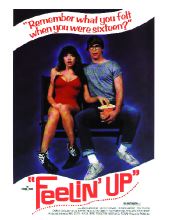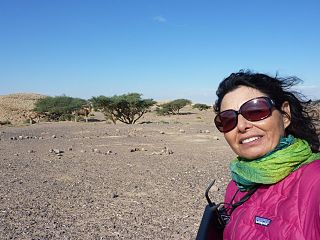
Winter Kept Us Warm is a Canadian romantic drama film, released in 1965. The title comes from the fifth line of T.S. Eliot's The Waste Land.
David Secter is a Canadian film director. He is best known for the 1965 film Winter Kept Us Warm, the first English Canadian film ever screened at the Cannes Film Festival. Widely considered a key milestone in the development of Canadian film, Winter Kept Us Warm was a gay-themed independent film written, directed and funded entirely by Secter, who is gay, while he was a student at the University of Toronto.

Feelin' Up is a 1976 comedy film written and directed by David Secter and distributed by Troma Entertainment.

Amazones d'Hier, Lesbiennes d'Aujourd'hui is the name of a quarterly French language magazine published starting 1982 by a lesbian collective in Montreal made of Louise Turcotte, Danielle Charest, Genette Bergeron and Ariane Brunet.
Rodrigue Jean is a Canadian film director, screenwriter, and producer of Acadian origin. He has been a theatre director, dancer and choreographer.

Frank's Cock is a 1993 Canadian short film written and directed by Mike Hoolboom. The eight-minute production stars Callum Keith Rennie as an unnamed narrator who discusses his relationship with his partner, Frank. The two met while the narrator was a teenager and spent nearly ten years together. Frank has since been diagnosed with AIDS, and the narrator fears his death. The story was based on the experience of one of Hoolboom's friends at People With AIDS, which Hoolboom adapted after receiving a commission to create a short film about breaking up.
Thomas Waugh is a Canadian critic, lecturer, author, actor, and activist, best known for his extensive work on documentary film and eroticism in the history of LGBT cinema and art. A professor emeritus at Concordia University, he taught 41 years in the film studies program of the School of Cinema and held a research chair in documentary film and sexual representation. He was also the director of the Concordia HIV/AIDS Project, 1993-2017, a program providing a platform for research and conversations involving HIV/AIDS in the Montréal area.
Justine Pimlott is a Canadian documentary filmmaker, and co-founder of Red Queen Productions with Maya Gallus. She began her career apprenticing as a sound recordist with Studio D, the women’s studio at the National Film Board of Canada (NFB), in Montreal. As a documentary filmmaker, her work has won numerous awards, including Best Social Issue Documentary at Hot Docs Canadian International Documentary Festival and Best Canadian Film at Inside Out Film and Video Festival for Laugh in the Dark, which critic Thomas Waugh described, in The Romance of Transgression in Canada as "one of the most effective and affecting elegies in Canadian queer cinema." Her films have screened internationally at Sheffield Doc/Fest, SEOUL International Women’s Film Festival, Women Make Waves (Taiwan), This Human World Film Festival (Vienna), Singapore International Film Festival, among others, and have been broadcast around the world.

Claudia Morgado Escanilla is a Latino-Canadian filmmaker, writer, script supervisor, producer and curator. She has worked on the festival circuit and commercially. Morgado was the script supervisor of film or television shows including The Twilight Saga: New Moon (2009), The Twilight Saga: Eclipse (2010), Hyena Road and Legends of Tomorrow.
Guy Glover was a senior National Film Board of Canada (NFB) producer and administrator.
Sarah Abbott is a Canadian filmmaker and artist. Abbott graduated from Queen's University with a major in Film Studies and Drama, she received a Master of Fine Arts degree for Art Video at Syracuse University and is pursuing a doctorate at Royal Roads University for Interdisciplinary Social Sciences. Abbott has been involved in film-making for over 20 years and has received several awards for her work such as the “Saskatchewan Lieutenant Governor’s Arts Award for Arts and Learning” in 2012. Abbott is known for her work in gender and First Nations specific films and for bringing awareness to these issues through her short and experimental films. Abbott was a founding individual involved in the creation of Mispon, an indigenous film festival in held in Regina, Saskatchewan. She is currently employed as an associate professor for the film department at the University of Regina.
The Pinco Triangle is a Canadian documentary film, directed by Patrick Crowe and Tristan R. Whiston and released in 1999. A profile of LGBT life in Sudbury, Ontario, the film mixes interviews with past and present LGBT residents of the city with vignettes depicting aspects of the directors' own childhoods in the city, acted by a cast including Michael "Bitch Diva" Fitzgerald and Lorraine Segato. The film takes its name from blending the pink triangle, a common LGBT symbol, with the INCO Triangle, the former employee magazine of INCO's mining operations in Sudbury.
Jeanne Crépeau is a Canadian film director and screenwriter from Montreal, Quebec, best known for her film Julie and Me .
Hey, Happy! is a Canadian science fiction comedy film, directed by Noam Gonick and released in 2001.
Laugh in the Dark is a Canadian documentary film, directed by Justine Pimlott and released in 1999. The film profiles a group of gay men who, in response to the HIV/AIDS crisis of the early 1980s, moved to the faded resort town of Crystal Beach, Ontario with an eye to reviving it as a gay resort comparable to Provincetown or Fire Island; spearheaded by Gary Colwell and Don Morden, the group launched a bed and breakfast, a restaurant and a drag cabaret.
Straight to the Heart is a Canadian drama film, directed by Jean Pierre Lefebvre and released in 1968. The film stars Robert Charlebois as Garou, a committed pacifist who is detained by mysterious authorities who try to brainwash him into supporting and defending war, and Claudine Monfette as his girlfriend.
Where Lies the Homo? is a Canadian short documentary film, directed by Jean-François Monette and released in 1999.
David Roche Talks to You About Love is a Canadian short drama film, directed by Jeremy Podeswa and released in 1983. It is a filmed version of performance artist David Roche's theatrical monologue of the same name, featuring Roche's observations on his successes and failures in his romantic and sexual relationships with men.
I Know a Place is a Canadian short documentary film, directed by Roy Mitchell and released in 1999. A reflection on gay life in Sault Ste. Marie, Ontario, the film profiles Bob Goderre, a retired steelworker who hosted regular parties for gay residents of the region in his home in the 1960s and 1970s.





